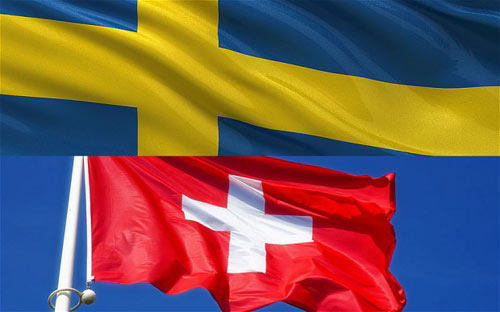当前位置: Language Tips> 双语新闻
Chinese confuse Sweden with Switzerland

|
Both nations' names are written similarly in Mandarin - Ruidian (Sweden) and Ruishi (Switzerland). The two European nations - one known for its chocolate, cheese and watches; the other for Ikea, Volvo and the Seventies pop band Abba - have often been confused for each other among the Chinese. The problem largely stems from the fact that both nations' names are written similarly in Mandarin - Ruidian (Sweden) and Ruishi (Switzerland) – which begin with the same symbol, according to the Swedish Consul General Victoria Li in China. In an effort to put an end to the mix-up, the Swedish and Swiss consulates in Shanghai have launched a competition on the Swedish Consulate website, asking Chinese people to come up with funny ways to help differentiate the two countries. Submissions can be accepted as a blog post, cartoon, photo, short film or in any other format. The winner with the best submission will receive a 12-day trip to Sweden and Switzerland and will be expected to report back on their impressions of both countries following the trip, the website states. Entries will be accepted until November 20. The organisers have also devised a humorous campaign logo portraying a montage of objects and people associated with Sweden and Switzerland on separate maps of each country. Sweden’s map features meatballs, a Viking, Pippi Longstocking from Astrid Lindgren’s books, as well as two male cartoon figures with a heart between them symbolising gay marriage, which remains illegal in Switzerland. Switzerland's map features cheese, fondue, the Alps and a picture of Roger Federer. China may not be the only country struggling to tell Sweden and Switzerland apart. Residents of Spanish-speaking countries also fall victim to the confusion as Sweden is spelt ‘Suecia’ in Spanish while Switzerland is called ‘Suiza’. Sweden and Switzerland aren't the only destinations that have caused confusion among travellers. Last month, a British holidaymaker hoped to explore the architecture of the Alhambra Palace in Granada, Spain, but instead mistakenly caught a flight across the Atlantic to the tropical Caribbean island of Grenada following a confusing booking blunder. Earlier this summer, two US holidaymakers were flown to the wrong continent after an airline confused two airport codes. The misconception between Sweden and Switzerland isn't the only incident for which Chinese tourists have recently come under the light. Last month, Communist Party tourism chiefs issued a “Guidebook for Civilised Tourism”urging first-time Chinese travellers to cut back on poor behaviour including public displays of nose-picking, swimming pool-soiling and the discussion of pork in a bid to improve the country’s image overseas. China was the biggest spender in international tourism last year, overtaking Italy, Japan, France and Britain, and is the world's fastest-growing tourism source market, according to the latest figures from the World Tourism Organization earlier this year. |
在普通话中,这两个国家名字写起来有点相似——瑞典(Ruidian)和瑞士(Ruishi)。
据瑞典驻上海总领事维多利亚(Victory Li)女士说,造成这一问题的很大原因在于这两个国家的名字在中国普通话中写起来有点相似——瑞典(Sweden)和瑞士(Switzerland),他们的第一个字相同。 为了终止这一混淆,瑞典驻上海领事馆近日携手瑞士驻上海领事馆在瑞典领事馆网站上启动了一项创意比赛,邀请中国人民以新颖幽默的方式正确区别出这两个国家。表现形式不限,可以是一篇文章、一幅画、一组照片或一部短片,也可以是其他任何形式。
但是,中国并不是唯一一个会把瑞典和瑞士搞混的国家。讲西班牙语的国家的民众也经常混淆,他们常把瑞典拼成瑞士,而把瑞士拼成瑞典。
(译者 godness 编辑 丹妮) |
上一篇 : 查尔斯年满65岁 尚未接班就领退休金
下一篇 : 海外华人回国谋发展
关注和订阅


电话:8610-84883645
传真:8610-84883500
Email: languagetips@chinadaily.com.cn